First published in Rip It Up, May 1987
Having battled Goths, the Damned, and a rampant flying nun at the Milky Way (see part 1, ‘Dutch Courage and Dan Destiny,’ April Rip it Up), the Netherland dancing Chills reach Amsterdam ...
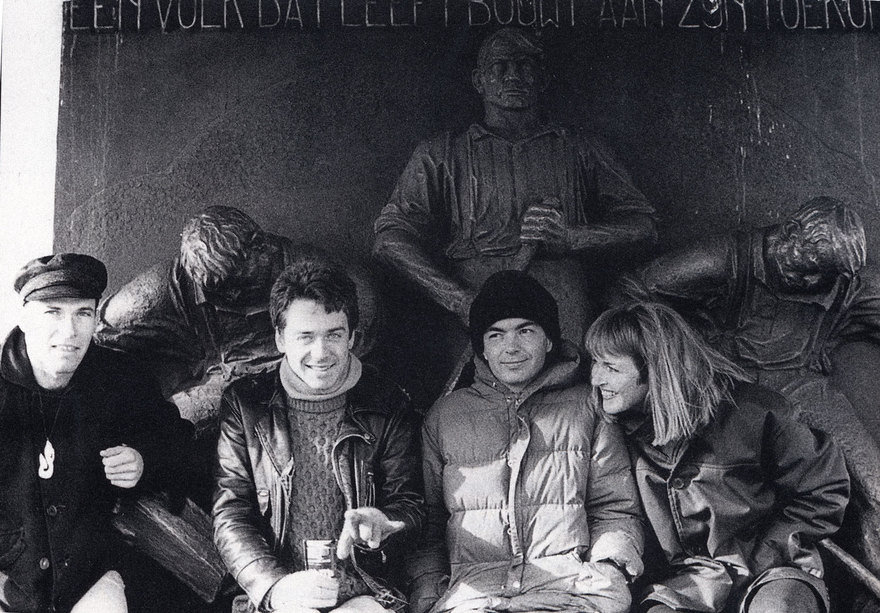
The Chills in Holland in 1987: Justin Harwood, Martin Phillipps, Andrew Todd and Caroline Easther
February 23, A Day Off in Sin City
After a night in one of the expensive hotels that the journalist has to sneak into with a sleeping bag and consequently doesn’t get breakfast at, the tour party heads back to Amsterdam for a day off. Unfortunately, it’s Monday and all the museums are shut, so the chief remaining spectacle is Amsterdam’s red-light district.
The vexed question of perceived sexism and reasonable behaviour has already arisen and been discussed at length on this tour, but the heart of the city’s institutionalised sex does have to be seen first-hand. It being Monday, many of the shopfront windows are curtained off, but as many are open for business.
In some, scantily clad women preen and mouth “come on in” to you as if you’re the first man they’ve thought worth smiling at all day, while others just look bored. A fan who saw the Milky Way gig recognises a couple of the band and extends an invitation to a sex show. There are plenty of those. Plenty too, of shops full of small, lurid books covering every sexual inclination. Many of the bookshops also carry standard newspapers and magazines for the locals.
The problem with the red-light district is that not a lot of people smile or are relaxed, which is odd for this city. There are a lot of young to middle-aged men shuffling down alleys together.
On the fringes of the area there are a number of head shops – those which specialise in drug paraphernalia and ephemera. The largest, the Old Man, carries a truly astounding range of cannabis consumption devices. Down the back it gets sleazier. The staff look nervous. Dave Vanian comes in to look at knives (they sell ornamental ones) as we leave.
Almost all hash cafés display notices forbidding the sale or consumption of hard drugs (rule number two is “Aggression will not be tolerated”) and so these are marketed furtively on the street. Dealers obviously feel it’s worth the risk to come to their potential consumers outside the head shops – and we’re treated to a little spectacle as we emerge.
A shifty little man coaxes a young male tourist down an alley, and we hear the word “coke”. As we have a last look in the window, there’s activity of some kind down the alley and the other shifty men and the tourist’s friends look concerned. The young man has tried, purchased, and been promptly busted by card-waving plainclothes cops.
Locals begin to emerge from nearby shops to look and laugh. Laugh like hell, in fact. The police are interested in the dealer and eventually send the young man on his way with a smacked bum and a lighter wallet, his heart probably still doing double time.
All this takes place in a relatively wide, bright and busy street and is just absorbed into the afternoon, which is the way Amsterdam is. But it shows up what a turkey of an idea buying drugs in the street is. If you manage to avoid getting ripped off in some way (and if they can, they will) you might get busted.
Back at the hotel, everyone rests up for a while. Caroline declares her intent for an early night, day off or no. She’s been getting run down by the touring bustle and needs a rest. Tall and strongly built, she’s possessed of the kind of well-rounded, solid sanity you often find in long-term Wellingtonians. It helps them live there. At 28, she wouldn’t have been in The Chills had it not been for the fact that Martin admired her playing and made it clear she was the drummer he wanted. The tour has been an upheaval and she’s been spending rather a lot on toll calls to her boyfriend, Alan, who is scraping up the money to come to England.
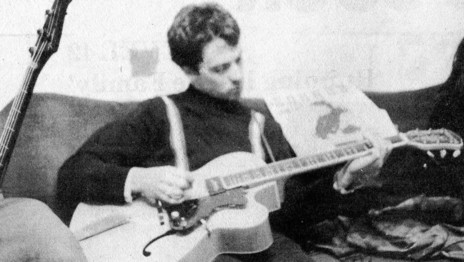
Martin Phillipps, Rip It Up, April 1987 - Russell Brown
A European tour is a pressure-cooker way for roles to emerge in a new band, but things are settling into a kind of order. Andrew Todd, for instance, is the main musical collaborator with Martin – because he’s classically trained and because his instruments, the synth and electric piano, colour the sound of each song most (and Chills songs are often about colour). It also makes things difficult for him and he worries over it. He’d like a big sampler and a proper Vox organ to play with.
But it’s just going to take time to find the depth in songs, he says: “With all Martin’s songs it’s like getting a great big box of chocolates – it takes a while to get around them all.” The first songs to come together have been the rock ’n’ rollers, more about the guitar and rhythm section and he sometimes ends up looking estranged off to the side of the stage behind his keyboards. One senses that he’ll come into his own in the studio.
In the end, everyone has dinner at a nice Indonesian restaurant, but bar prices send the partying back, again, to the hotel room. A New Zealand dollar buys roughly one guilder and the tour party have to be careful. You too would choke if you walked into the wrong sort of bar and were asked $13 for a double vodka and tonic. At least a decent hole is made in the beer backlog – courtesy of the all-too-willing Brit indie band Stump, staying at the Quentin too. They had some beer but they drank it all, they explain.
Oh, man ... the 70s are rising and walking again. Hot Chocolate are Top Five in the UK album charts and 4/4 disco is coming ’atcha from Europe and Chicago ... the sound ...
But remember the way the early 70s looked? The buildings? Doesn’t the sight of true 70s tack give you a little tremble? Who could fail to be affected by the naive wackiness of the original Perspex hemispheres and concrete sculptures of Christchurch’s QEII Park complex? The prefab kitsch of Auckland’s Downtown Mall facade? The spirit that put toytown houses with culverts for window frames on the hills of Wellington?
And so much of it in that misbegotten dark purple, the least appealing of a number of tacky, unappealing and, again, fundamentally naive hues in vogue for up-to-the-minute building decor.
Ah, but it was a weird time. We were so techno-naive we allowed ourselves to be convinced that a stupid plastic cone with a gobstopper in the bottom or useless plastic sticks that twisted together into models were a “space age,” “70s” way to eat ice cream. There is no space age way to eat ice cream. But what do people use for towing-ball covers now you don’t get it in those little plastic spheres now?
But think for us, the ones who had to pubesce into a mess, a political and cultural ice age. We absorbed oil shocks, economic collapse, a young Muldoon, Norm Kirk snuffing, a permanent economic slide and a big hangover from the 60s. It must have been so confusing.
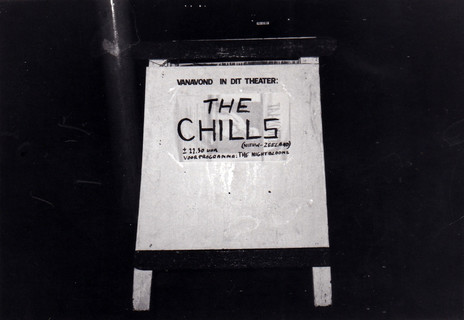
The Chills, Netherlands 1987. - Martin Aston
Feb 23, Doornroosje, Nijmegen
We were doomed from the moment we left the hotel,” tour manager Craig Taylor sighed later, and he was dead right. Morning, outside the Quentin, and Martin’s extremities have turned blue. Bright blue. It’s his cold. To try and keep warm his tortured throat, he’s been wearing a bright blue balaclava and woollen gloves. Now he returns with Kate and he’s wearing iridescent sky-coloured gym boots. Crazy.
The drive to Nijmegen, a university town, is not a particularly long one. Or shouldn’t be. But a wrong turn adds considerably to the journey – Justin has the thankless task of navigator on this occasion. And now we’re driving round and round Nijmegen in search of the venue.
“Are we hanging laps?” Lighting technician Lisa asks innocently. “Y’know – hanging laps around the town. We used to do that on Friday nights when I was young. Drive round and round ...”
We are hanging laps. And it’s boring.
Eventually we find the Doornoosje, yet another nice little government-aided venue. It apparently used to be a schoolhouse, and in the gallery and the café room the light coming in through the windows is of the marbly kind you associate with old classrooms in the afternoon. The high windows of education.
The backstage room is big and triangular with a long table and Kate Tattersfield sits and patiently tunes guitars, glad of a little company while the band is sound checking next door. The Singer’s Girlfriend figure is not a popular one in rock mythology, but Kate has proved indispensable on this tour. She can change a string in the space of a song. Martin breaks a few strings and it’s interesting to ponder who would have done it if she hadn’t come along. She can lift things too.
Kate also acts as a kind of sanctuary for Martin. He takes only a sporadic part in the daily bustle of things and can otherwise often be found playing poker for small change with Kate. He insisted on her coming and is rarely apart from her.
Dutch group the Night Blooms, support on about half the Dutch dates, roll up, this time with a few mates, who begin to make an impressive assault on the beer in the fridge. So impressive that it runs out.
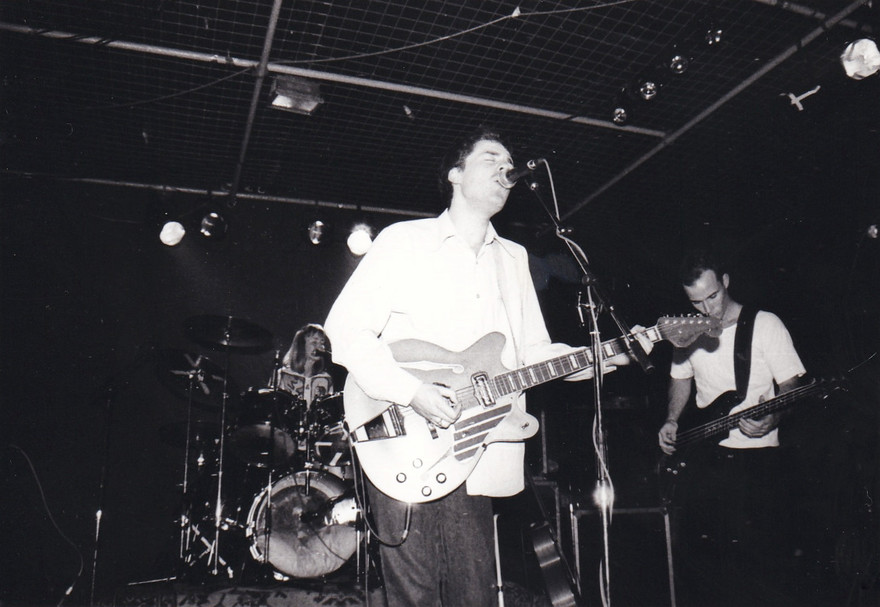
The Chills, Netherlands 1987. From left: Caroline Easther (drums), Martin Phillipps, Justin Harwood. - Martin Aston
Every now and then the last Chills used to have a gig where utterly everything that could went wrong – Chills 10 seems to be carrying on the tradition. Nijmegen is so bad it’s actually funny. Martin’s voice reaches its utter nadir, often diverting absurdly as he reaches for a note, and he snaps string after string. Songs stumble, stagger and crawl through their lengths. All this to the gentle and constant accompaniment of the sound of breaking waves through the PA, scattered with the odd sharp CRACK or loud BANG. Soundman Andrew Frengley later awards those “responsible” the accolade of “the worst, the very worst, PA company I have ever worked with.”
The shame of it is the Nijmegen crowd is both good-humoured and enthusiastic and deserved a good gig. But they’re smart enough to realise things are going seriously awry, and generous enough to laugh along with it. Maybe next time.
For now it’s back at last to the hotel to sleep and, no doubt, to dream. Oh. This was also the night the van door started falling off.
Someone’s dream. The Numinous Paint. I had a can of numinous paint, once. I kept it under my bed and every night I’d roll it out, prise open the lid and dip my fingers in it. It turned my hands like the diffuse prism in a garden spray and I could draw with the paint on my fingers. On the air. I could draw on the air.
Smears and dots of paint would hang there like snail trails, even if you brushed against them lightly. I’d build whole heaving architectural constructs that stretched from one end of my room to the other; shimmering webs, imaginary cities, six-legged wasp-waisted people to live in them. It glowed in the dark too.
Yes, and you could paint it on solid things too. Funny thing was it didn’t make things look any different, except in a way you couldn’t pin down. It just made things look GOOD, irresistibly good. You’d paint it on something everyday and plain, and people would hold the thing in their hands and marvel at it. Not for being anything other than it had been before the paint, but simply for what it was.
It was a good way to really get to know your household objects; chuckle at the rich, red humour of an apple; weigh up the apparent contradictions of a wristwatch, feel the spirit in your favourite coffee cup. I never bothered with body painting. I don’t think people need it.
People used to say to me: “Do you ever think about painting the house?” I thought about painting the house all the time. But I didn’t have enough.
Feb 25, Paard, Den Haag
Den Haag, or the Hague, should be an interesting place, we thought. International Court of Justice, European Parliament and so on ... but of course we didn’t see any of that. A rock and roll tour is actually a very poor way of seeing a country. You get up late because you’ve gone to bed late because you didn’t start playing till 11.30pm, you drive, load, soundcheck, eat, hang around, play, load out ... Den Haag is a good gig, rather loud, where the band pulls off a topping version of the tricky instrumental ‘Balancing’, the meal is the best of the tour ... and that’s it, basically.
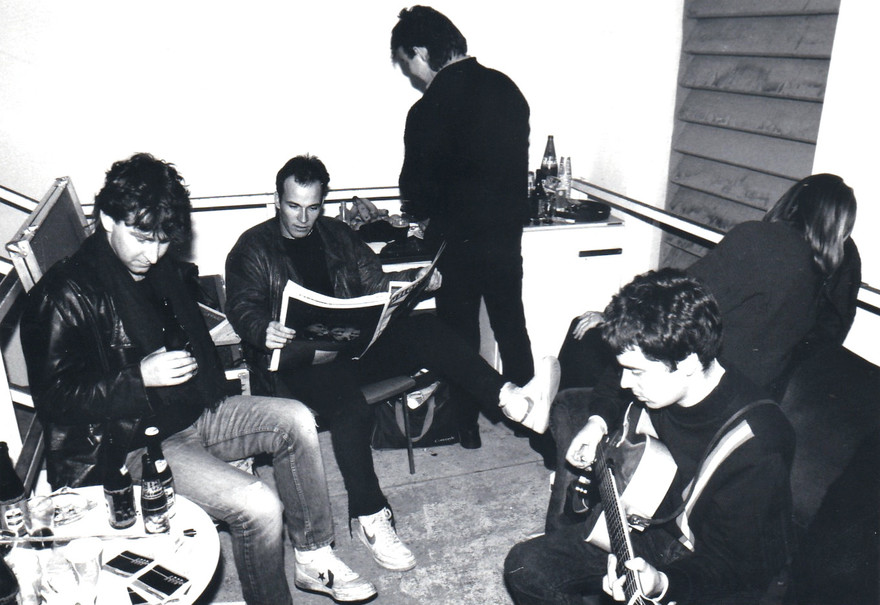
Rip It Up journalist Russell Brown with Chills members Justin Harwood and Martin Phillips, Netherlands 1987. - Martin Aston
Feb 26, Vera, Groningen
Groningen is the northernmost city in the Netherlands, it’s noticeably colder and there are even more bicycles than in Amsterdam. Swarms of them. You wouldn’t expect much of such a place, but take it from me, Groningen is a fine little city.
The majority of its youth apparently live on student bursaries or the dole, both fairly generous in Holland. This gives them time for enterprises like the Vera. Many of the tour venues are run wholly or partly by volunteer labour, but none have the warmth and sense of community of the Vera. It’s in an old building in the middle of town and doubles as a cheapo restaurant during the day, with an atmospheric little grotto of a bar downstairs. The people are helpful and the PA and lights are basic but of good quality.
Groningen’s youth are a hip lot too. The record shops are full of imports, including a good few Flying Nun releases (I personally rescued Children’s Hour’s ‘Ya Ya Ya’ from bargain-bin ignominy). The youth know how to enjoy themselves at a gig too – none of this Dutch reserve, it’s like a hot and heavy night at the Windsor used to be and people sway and dance and embrace and laugh and drink. Three encores, easy.
Afterwards, upstairs, the formidable Sil produces extra bottles of vodka and encourages us to stay. Andrew Todd and Justin get enticed off to a disco. Caroline and Kate are tired and go back to the horrible hotel and Martin won’t stay without Kate. Craig is somewhere, so it’s Andrew Frengley, Lisa and me who represent New Zealand through the small hours.
Andrew discovers the Vera is threatened with a cut in council funding and pens on the spot a letter encouraging the city council to do otherwise. He tells them that they should be grateful their city has something like this – where he comes from, almost all the entertainment outlets are controlled by corporate interests. He is rewarded with a shower of kisses.
Andrew should know about New Zealand venues. Just before coming over he sold his small production company and he’s been through them all, many times. But he’s sick of working for bands that he hates, as he sometimes had to do, and now he’s thrown his all in with something he loves. He’s a Chill for a while. Lisa only began doing lights at the start of the New Zealand tour and is desperately conscious of wanting to be as good as possible. “I knew all the technical side of it when I started the tour,” she explains. “It’s just the artistry of it that I have to learn.” She’s coming along just fine.
Feb 27, Effenaar, Eindhoven
It was a very close thing, this day... sooo close. An early rise, a trip around the record shops and a return to find Craig in the van, fuming. He’s just found out by phone that we have to reach the Swedish Consulate in Den Haag, a long way to the south, to pick up Swedish work permits or ... or else. It’s Friday and there’ll be no other chance to do it before leaving for Sweden on Sunday. They’ve been ready to go for almost half an hour. The consulate closes at three and it’s going to be tight.
The weather seems determined to stop us. Thick, driving rain pushes against the windscreen and it’s unnerving to think that we can’t even afford to slow down. A tense general silence gradually melts into touring humour – fast, ritualised repartee, often laced with a razor-edge irony that gets things said. Every touring troupe has it in some form and you couldn’t get by without it.
We stop at a service station and Craig makes some phone calls. He manages to persuade someone at the consulate to hang around an extra half hour. We go through Rotterdam and it seems we’re gonna make it. Until ...
“Are we there already? Wow, that was ...”
“Er, no ...” Craig smiles a smile so grim you could go into mourning for it, and he looks fixedly at the map. “We’ve, ah, gone the wrong way, we have to go back to Rotterdam ...”
“Hanging laps ...” says Lisa.
“Big ones.”
It gets worse. The road to Den Haag is bumper-to-bumper for a good deal of its length. Short of driving on the wrong side of the motorway there’s nothing we can do. By the time we eventually reach the outskirts of the city we’re into the Friday rush hour and have to start making snap decisions on which lanes to choose. Intense.
By some miracle we find the building, Craig grabs everyone’s passport, rushes in, and ... yes, we’re late but not too late. As we drive away Craig details the awful consequences that would have ensued from blowing out that part of the tour and everyone breathes easier.
We still have to go back to Amsterdam before heading south again to tonight’s gig in Eindhoven, near the German border, but that seems almost incidental by now, even though it is 4pm, the official load-in time on the itinerary.
In Amsterdam Craig decrees a half-hour turnaround – Justin and I decide to go for a shawarma and a falafel respectively, and a chat. They do them just like the Middle East Café in Auckland, same sauces and everything. Not that Justin can have the sauces anyway. A kidney condition means that unseasoned meat, bread and potatoes are virtually all he can eat; the pigments in all other vegetables do him in.

The Chills in Amsterdam, 1987. From left: Caroline Easther, Justin Harwood, Martin Phillipps, Andrew Todd. - Martin Aston
Curiously enough, he’s the most dynamic and energetic one on the tour. The Hyperactive One is the role he’s settled into. Although he was a precociously skilled player in his teens, his kidneys meant a different sort of adolescence: “When everybody else was rebelling against their folks and drinking and smoking at parties I kind of rebelled against that,” he explains.
After playing in the original Big Sideways project at 17, he’s mainly been in other-side-of-the-tracks outfits like the later Coconut Rough. He had only seen the Chills live once before going to the first practice. But now he’s remarkably clued up on past Chills line-ups and is endlessly willing to discuss the band’s music. If there are still any of you dipshit industry snobs out there, he says the Chills is the most challenging band he’s had to play in by far.
“It’s Martin’s songs – he doesn’t write standard verse-chorus-bridge songs at all and sometimes he’ll play you something new on his guitar and you’ll think ‘What can I do with that?’ I thought that when he played me ‘Pink Frost’.”
With a mind unfettered by intoxication, Justin seems to be constantly conscious of the new musical sphere he’s in, taking it in, bouncing it out, thinking about it and questioning it. He’s also something every band needs – someone who’s never too pissed to drive the van.
By the time we make Eindhoven it’s almost 8pm and the relief on the local promoter’s face when we roll up is visible. Things begin to go right – the PA is simple, without even an EQ to set, and well put together. Andrew is pleased with the sound almost immediately. In the dressing room there’s a pow-wow of various promoter-type people, including the band’s booking agent, Colin Davie. Two young fanzine editors take Martin away for interviews. These guys work hard – they have to interview in English, transcribe, and then translate into Dutch.
A copy of one, Go Gor Gold, is left behind and it’s fascinating to “read” the Flying Nun backgrounder in it. The language is foreign, but the details – The Enemy, The Clean, Roger Shepherd, Doug Hood, ‘Tally Ho!’, $70, etc – indicate the same old story. It’s interesting that this far away it’s becoming almost mythologised. Take a bow, Garage mag.
While there are a few minutes left before going on stage, Martin sits down and updates his diary. He’s been scrupulous about daily entries and it’s typical of him to not want to lose any of these experiences. There’s a documentary vein to his songs now too, like the soft, buzzing ‘Singing in My Sleep,’ with its lines about “Trying to cope with the pressures of musical life,” and “Singing in my sleep / songs of such beauty and sadness,” and something about the blind leading the blind.
The gig is a good, not great, one. A few German fans have made the trip across the border and cheer the openings of songs like ‘Pink Frost’ and ‘Doledrums.’ ‘Balancing’ is presented again but doesn’t come off so well this time.
The south of Holland is gearing up for the start of an annual fiesta (hence the traffic getting here) and the Dutchman we choose to ask hotel directions from seems to have been getting in some early celebrating.
Craig leans out the window. “Hey you! Ya sober?” As he totters over, he patently is not, but he’ll show us – if we give him a lift home. That seems fair so in he gets. “Haf you any beer” he asks, looking round hopefully. He shows us the hotel, we take him home and then look a little like getting lost again.
“I told you we should have just paid for a taxi from the hotel for him ...” Craig murmurs.
But we get back and everyone beds down. Craig and Colin sit up for a while and talk biz. Colin thinks the band should play a string of smaller festivals in the Dutch summer circuit rather than one big one. And then there’s this thing in Italy. And The Tube is confirmed – at least for a video and interview and probably for a live performance.
But the big worry is the new withholding tax due to come into force in about a month. A nice little invisible tax for the Tory government (because it only applies to demned furreigners anyway), it will require a substantial upfront payment from every band playing or recording in England. It’s hardly a break with form for the Thatcher government, which has been relentlessly anti-culture all along. It’s not going to help anyone.
After a few days on the road it begins to sing little songs to you. Ravaged ears ring with the drones, whistles and rattles that belong to the van and from them emerge songs, with clear fluid voices. As we speed towards Den Haag I heard, I swear I heard the Seekers doing ‘The Carnival is Over’. Scary, man ...
Martin: “Billion Dollar Babies? Now there’s an album I could probably sing the words of from beginning to end ... ‘Hello, hurray ...’”
Feb 28, Waakzaamheid, Koog a/d Zaan
There’s an irrepressible cheer before the gig in the curiously named town of Koog a/d Zaan; there’s a good pinball machine, a dartboard and great food. And this is the last gig in Holland. It’s been nice but it’s been flat and enough is enough. The band pulls out a really good gig but the curiously mixed crowd hang back like stunned mullets until the very end. As soon as the gig ends the reason is clear – it’s a disco; they simply didn’t know what hit them. Oh well.
It’s the last load out for the journalist and he gets right into it. Ask any roadie about the simple joy of lifting things. If you do it right it makes you feel great.
After dragging Andrew Todd off the dancefloor, we head back to Amsterdam for the last time.
Feb 29, Sweden and goodbye
No chances are being taken this time. Everyone’s up good and early for the drive to make the ferry. They’ve said goodbye to Frank and Philip and added a photo and their names to the latest of the pile of guest books in the foyer. The Scandinavian leg will be a tough one of 300km drives just to get to the hotel after the gig in some cases, and the van had better hold together. So – goodbye, good luck, and I’m going back to bed.
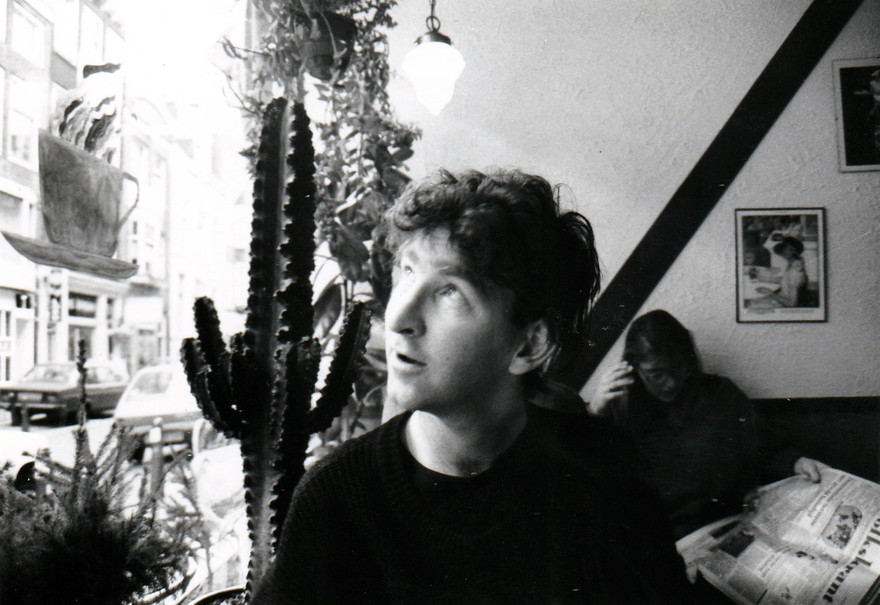
Russell Brown in an Amsterdam café during The Chills' 1987 European tour. - Martin Aston
March 19, Boston Arms, Tufnell Park, London
Tom Verlaine is playing tonight, one tube-stop away from the Chills on the Northern Line and it’s interesting to see who gets off at Kentish Town and who stays on for the Chills. About half ’n’ half of the hipsters, in my carriage.
On the bill tonight are also the Razorcuts, indie popsters drummed for in that same idiosyncratic way by NME staffer and ex-Mainly Spaniard David Swift, and The Yard Goes On For Ever, new band for Ed (ex-Saints, Laughing Clowns) Kuepper. The Razorcuts have to play to a crowd that’s still arriving, but things have warmed up for Ed’s long-awaited return.
He still can’t sing (and just smiles cryptically instead of talking) but Ed Kuepper sure knows guitars. He pulls songs from throughout his career, but this young band is more like the Saints than the Clowns. This is sheer, sweet guitar classicism and it hums. Just ask Lindy Morrison.
The Chills take the stage to cheers and Martin says “Good evening, we’re the Chills” in German and it’s off to a flying start. But some of the Kiwis in the crowd want to hear their memories rather than a band and it loses a little momentum, to be picked up at the end by a monumental ‘Love My Leather Jacket’ and ‘Balancing’. With time only for one encore, it’s another good gig but not quite the great one they wanted. They’ve no doubt suffered from following the directness of Ed Kuepper too. As a friend put it, the Chills were like central heating but Ed was like toasting yourself in front of a two-bar heater, with both bars on. That probably sums up as well as anything the job of focusing that lies ahead of the Chills. But hell, they’re still learning the songs.
Backstage, tales of Scandinavia are unlovely, but Germany, where they are on the diligent Normal Records, seems to have been quite crazy. Everyone still sounds excited about Germany. But for now, there’s a gig tomorrow night in swinging Scunthorpe. F Nun man Gary Cope, who joined them in Germany, parts company here, but the new passenger, much to Caroline’s delight, will be her boyfriend Alan, who arrives tomorrow morning. The journalist bums a lift home.
Oh, and the Chills are still having a bit of trouble with their rider.
“Now close your eyes,” said the Gryphon. “Let your mind drift, let the intuitive nature come to the fore ... see from inside ... see anything?”
“Sort of ...” said Alice, not really sure.
“Just think about everything ... the works. The whole of spacetime, all your friends and every ice cream you ever ate. All at once.”
“That’s a tall order, Gryphon.”
“Shhh! Once you get that feeling of standing back and having a look at it all right, you’ll begin to feel drawn into it, right to the heart.”
Alice tried.
“Ye-esss ...” she murmured, breaking a full minute’s silence. “It’s bright ... hold on, it’s coming into focus now, and ... oh ...”
“That, child, is an intuitive impression of the order of everything, space-time and beyond, in, er ... two dimensions. I believe that it is the dimensional form which has been most popular with your race for communicating abstracts.”
“It’s a quartered square encompassing a circle,” Alice said slowly. “Encompassed in turn by another circle. It’s a nice enough arrangement.”
“Nice enough for two dimensions, I suppose,” sighed the Gryphon. “But you should see it in four billion ... it’s a real hummer.”
--
An edited version of ‘Frostbite and Cold Sweat’, first published in Rip It Up, May 1987.